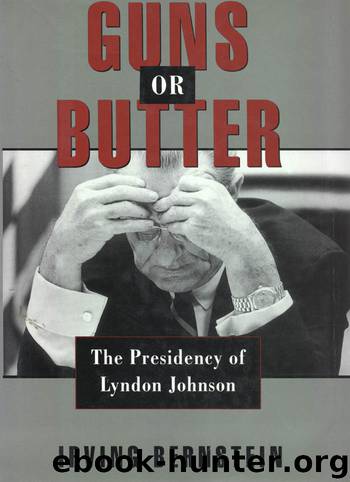Guns or Butter by Bernstein Irving;

Author:Bernstein, Irving;
Language: eng
Format: epub
Publisher: Oxford University Press, USA
Published: 1996-10-18T04:00:00+00:00
III
LYNDON JOHNSON—EMBATTLED, BESIEGED, UNDERMINED
12
Unhinging the State of the Union
AMONG the years of Lyndon Johnson’s presidency 1965 stood alone at the top in both domestic and foreign policy. Exploiting his massive victory in the 1964 elections, the President rammed through the Congress the next year a broad array of domestic legislation: Medicare, the Elementary and Secondary Education Act, the Higher Education Act, the Voting Rights Act, the immigration law, the Water Quality Act, the Solid Waste Disposal Act, along with other statutes of lesser consequence. In 1965, as well, Johnson fatefully led the nation into the Vietnam War.
In the early part of the year the White House was not organized to handle the immense flow of domestic legislation. While Bill Moyers was ostensibly in charge, he seemed to have little interest in the responsibility and discharged it indifferently. In July 1965 George Reedy resigned as White House press officer and the President replaced him with Moyers. He then installed Joseph A. Califano, Jr., as his special assistant on domestic affairs. Califano would remain in that position until the end of the administration and would play a decisive role in shaping domestic policy.
He had been born and was raised in Brooklyn. He attended Jesuit schools, including Holy Cross College. He then went to the Harvard Law School, from which he graduated in 1955. Califano would later explain his sensitivity to social needs as arising from his Jesuit schooling and Paul Freund’s analysis of the Constitution in law school. He then spent three years in the Navy in the Judge Advocate General’s office in the Pentagon. In 1958 he joined Dewey Ballantine, a big Wall Street law firm. At this time he had no political commitment, leaning, if anything, toward the Republicans.
Califano spent the Washington’s birthday weekend in 1960 at home sick. He read John Kennedy: A Political Profile by James MacGregor Burns and sat in on a couple of meetings his wife held in their apartment on Democratic reform politics. Califano was hooked. He became a Democrat and a vigorous supporter of JFK, throwing himself into the campaign at the “lowest imaginable level.”
After the election, because he was impressed by the new President’s appointments and was hopelessly saddled at the law firm with an “enormously boring but complicated stock-split transaction,” Califano began to think about going to Washington. He learned that McNamara had named Cyrus Vance, a very good lawyer, general counsel at Defense. Though he did not know Vance, on Wednesday before the inauguration Califano wrote him saying that he would like to work for him and enclosed a resume. Vance phoned on Friday asking him to come down for an interview the next day. On Monday Vance offered him a job as his special assistant. Califano would have jumped at once but could not shed the stock-split albatross until April. In 1962 Vance became Secretary of the Army and brought Califano along. Within a few months he became general counsel of the Army, “a wonderful opportunity,” he said, “for a 31-year old lawyer.
Download
This site does not store any files on its server. We only index and link to content provided by other sites. Please contact the content providers to delete copyright contents if any and email us, we'll remove relevant links or contents immediately.
| Anthropology | Archaeology |
| Philosophy | Politics & Government |
| Social Sciences | Sociology |
| Women's Studies |
The Secret History by Donna Tartt(19002)
The Social Justice Warrior Handbook by Lisa De Pasquale(12177)
Thirteen Reasons Why by Jay Asher(8874)
This Is How You Lose Her by Junot Diaz(6857)
Weapons of Math Destruction by Cathy O'Neil(6249)
Zero to One by Peter Thiel(5768)
Beartown by Fredrik Backman(5718)
The Myth of the Strong Leader by Archie Brown(5482)
The Fire Next Time by James Baldwin(5409)
How Democracies Die by Steven Levitsky & Daniel Ziblatt(5200)
Promise Me, Dad by Joe Biden(5132)
Stone's Rules by Roger Stone(5065)
A Higher Loyalty: Truth, Lies, and Leadership by James Comey(4939)
100 Deadly Skills by Clint Emerson(4901)
Rise and Kill First by Ronen Bergman(4761)
Secrecy World by Jake Bernstein(4727)
The David Icke Guide to the Global Conspiracy (and how to end it) by David Icke(4685)
The Farm by Tom Rob Smith(4489)
The Doomsday Machine by Daniel Ellsberg(4474)
